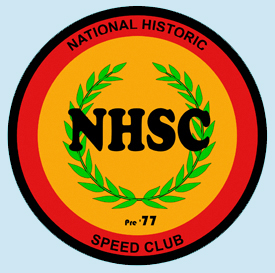| |

REGULATIONS
.
PRIVACY POLICY
.
GUIDELINES FOR PERSONAL TARGET TIMES
Base starting point
1. Where a competitor has previously competed at a relevant venue in the same car then the competitor’s fastest timed run, as recorded by the Venue’s official timing agent (Resultsman, etc), will be that competitor’s personal target time for the purposes of the PB Cup.
2. Only times set within the last 5 years will be referenced in 1 above.
3. If the performance of a car has been improved through modification since the time under 1 above was set then the driver’s Target Time will be set under the provisions of points 6 to 8 below.
4. If it is known the recorded fastest time was set in wet conditions and the current event is to be held in dry conditions, the Target Time will be set according to Guidelines 6 to 8 inclusive below.
5. A competitor’s target time set under these provisions will not be adjusted if the competitor beats that time in a practice run.
No previous time at a venue
6. Where a competitor does not have a personal best time recorded at a venue in their car entered in the championship the competitor’s target time will be based on the best time achieved on the competitor’s first two runs (whether treated by the event organisers as practice or timed) reduced by 1.5 sec for hill climb events and 2 secs for sprint events.
7. Where a competitor only completes one practice run because of a problem outside the competitor’s control, then that practice time will form the basis of the competitor’s target time, but reduced by 3 seconds
8. Where a competitor’s target time is set under any of the guidelines 6 to 7 above any improvement on that target time is limited to 3% or 1.5 seconds, whichever is the lesser (Championship Regulation 1.6.20).
General Provisions
9. The first two runs of any event will be treated as practice runs, even if the organisers stipulate only the first run is a practice run.
10. If the event comprises only three runs then the provisions in 6 to 9 above will still apply.
.
LATEST NEWS
Explanatory Notes to Personal Target Times Guidelines
For many competitors this will be the first time they have competed in a Personal Target Time based championship. Equally, many competitors will not have competed at some of the venues included in the championship calendar. For these reasons the setting of Personal Target Times for this first season is likely to be a challenging process. We hope that competitors will understand that given the gaps in Personal Best Time data, the NHSC Committee has done its best to identify methods for setting target times in different scenarios based on data that is available. These methods will be reviewed and discussed with competitors at the end of the season with a view to learning any necessary lessons and making adjustments for following seasons.
Note 1 The Guidelines are to be read in conjunction with clauses 1.6.19 and 1.6.20 of the Championship Regulations
Note 2 The Guidelines have been drafted with the intention of removing any subjectivity from the Target Time setting process.
Note 3 Guideline 2 is intended to ensure that all competitors remain competitive. For instance, as competitors become older they may not be able to set times they achieved 20 years previously.
Note 4 Guideline 3 is included so as to avoid competitors gaining an advantage through improving the performance of their car (more engine power, etc).
Note 5 Personal Best times set in wet conditions are likely to be slower than if that event had been held in dry conditions. If the current event is held in dry conditions this would confer an advantage and so Guideline 4 is intended to eliminate this advantage.
Note 6 Guideline 6 assumes that a competitor new to a venue is likely to treat their first practice run as a “sighting” run and that their times will improve with subsequent runs. In setting the Target time after practice run 2, the reduction of 1.5 seconds is thought appropriate in order to discourage “sandbagging”.
Note 7 Guideline 7 is intended to cope with failed runs, mechanical difficulties which slow a car or baulking (as some organisers do not allow re runs in practice).
.
Questions and Answers
If you have Any Questions about the National Historic Speed Club
Please email Steve Akers from this link
steve.nhsc@btinternet.com
1 Why are Classic Marques involved?
Under Motorsport UK rules, a new club cannot apply for a championship permit until it has existed for 2 years. A solution to this problem was cleared with MSUK whereby Classic Marques will apply for the championship permit and delegate the running of the championship to NHSC. We are very grateful to Classic Marques for agreeing to do this.
Also, given the practical difficulties and time delays faced by a newly constituted club in opening a bank account it has been agreed with Classic Marques that NHSC receipts and payments will be carried out through its bank account for the time being. Ian Beningfield acts as treasurer for Classic Marques and is also now treasurer for NHSC. Ian has set up strict controls to ensure that the two clubs monies are separately identifiable and he will report to the NHSC Committee each month in that respect. NHSC will establish its own banking arrangements as soon as is practical.
2 Why did you choose the particular venues the championship will compete at?
Firstly, being a historic series we have tried to arrange rounds that are held at historic venues. Secondly, this is a national (English) championship and events have been chosen that give us geographical coverage of the country. Thirdly, we have tried to arrange the calendar so that there is an even split between north and south with a couple of events in the middle to help reduce travel distances.
3 Why is the cut-off date 31st December 1976?
The championship is all about celebrating Historic Motorsport through competition in Historic Vehicles that seek to preserve the specification of their period. Cars which are either original competition cars or cars built to exactly the same specification as models with national or international competition history complying with the rules of the period.
Historic Vehicles (non-Rally) are recognised in the Motorsport UK Yearbook through Period Defined Vehicle classes A to H. NHSC has decided to focus on the post war period for vehicles constructed from 1st January 1947 through to 31st December 1976. This last date is the end date for Historic Vehicles as defined by MSUK.
4 Why are there two championships?
Not everyone has the equipment or the other attributes to compete for fastest outright time. The PB Cup is an alternative personal handicap competition which encourages individual competitors to improve their own times and potentially be rewarded for both consistency and improvement.
5 Why do we need to have information displayed on our cars in the paddock?
Most existing championships are all about the competitors and pay little regard for the spectators who come to watch us. Displaying information about your cars is part of our intention to engage more with spectators, giving them a better experience and thereby giving something back to our sport.
Competitors have always, in the main, been happy to chat with spectators as they wander around the paddock and this requirement is not intended to inhibit this. However, we are not always with our cars in the paddock or we may be not have chance to share all the details about our cars and its history.
6. Does the class structure in the Speed Championship also apply to the PB Cup?
No. The class structure is only relevant to the Speed Championship.
7. I am not sure if my car complies with the technical regulations. What should I do?
In the first instance please send in details of which aspects of your car you are concerned about. Please be as specific and concise as you can be. One of the NHSC technical/eligibility team will then determine the best way to respond to you. This will normally be by email, but might also be to arrange a telephone conversation if the matter is unclear or complicated. We would encourage registered competitors to raise any such queries before the first event if possible in order to help the smooth running of the championship.
.
NHSC – "the club for historic hillclimb and sprinting"
|
|














